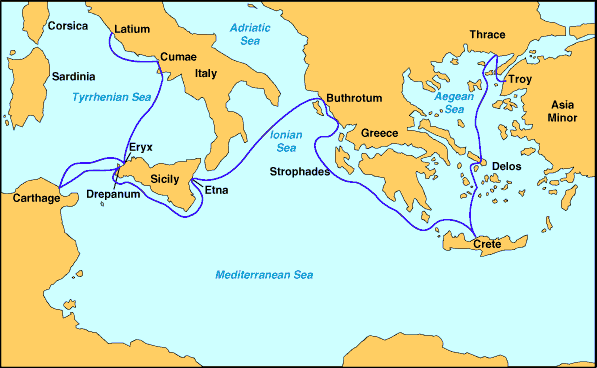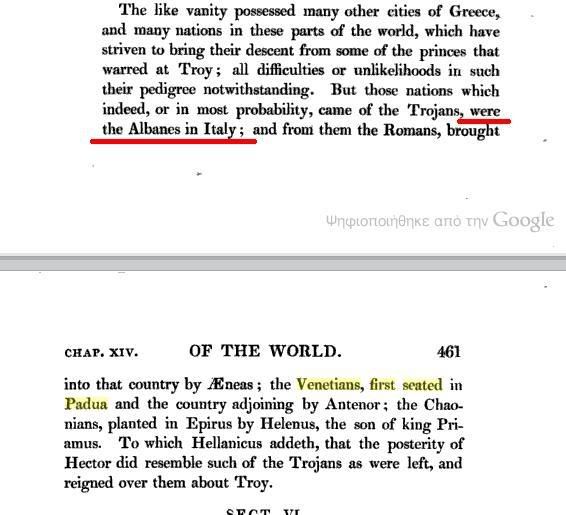Zeus10 wrote:Le te diskutojme per origjinen e popullit shqiptar. A jemi te mocem ne kete vend? A jemi te perjetshem aty, ne kuptimin relativ te fjales? A mos jemi nje shtresim mbi autoktonet? A kemi larguar dike prej andej? Apo jemi po aq te vjeter, sa gjithe kombet rreth nesh?
Opinioni im:
Ne jemi popullsite e ardhura nga PERENDIMI, ndoshta avangarda e atyre qe ne histori njihen si romake. Kjo avangarde perfshin popullsite qe dikur banonin rreth sot Portugalise, Spanjes edhe Frances qe njihen ne histori me emrin Albane dhe e vendosen qendren e tyre, atje ku sot eshte Roma. Albanet qe u vendosen ne Shqiperi zhvendosen ose treten popullsine vendase, qe ka qene semitike, ose dhe me e larget, duke u bere kombi dominant ne keto troje, per te pakten 1000 vjete. Gjuha e folur nga keta Albane u zevendesua ne Perendim nga gjuhet Romance te Perendimit, kurse ne Lindje nga gjuha Romake e Lindjes(greqishtja) dhe gjuhet e Ortodoksise Sllavike. Gjuha vernakulare e albaneve, ka filluar ne Portugali dhe ka mbaruar ne Lindjen e Mesme.
Perendimi i Ballkanit, gjeografia e te cilit ka bere te mundur ruajtjen madje edhe konservative te popullit dinarik qe jetonte aty nuk njeh ndonje mbishtresim te ardhur nga Perendimi. Rrenja -alb e perhapur ne gjeografine evropiane s'deshmon per kurrfare ardhjeje. S'ka as edhe nje grimce prove qe te deshmoje per nje vendosje albanesh ne Shqiperi apo ne pjesen perendimore te Ballkanit:
*In the 2nd century BC, the History of the World written by Polybius, mentions a location named Arbon[15] or Arbo[16] (Greek: Άρβωνα)[17] that was perhaps an island[18] in Liburnia or another location within Illyria. Stephanus of Byzantium centuries later, cites Polybius, saying it was a city in Illyria and gives an ethnic name (see below) for its inhabitants. Most likely it is a Croatian island of Rab.
*In the 2nd century AD, Ptolemy, the geographer and astronomer from Alexandria, drafted a map that shows the city of Albanopolis (located Northeast of Durrës). Ptolemy also mentions the Illyrian tribe named Albanoi,[19] who lived around this city.
*In the 6th century AD, Stephanus of Byzantium in his important geographical dictionary entitled Ethnica (Εθνικά)[20] mentions a city in Illyria called Arbon (Greek: Αρβών), with its inhabitants called Arbonios (Greek: Αρβώνιος) and Arbonites (Greek: Αρβωνίτης). He cites Polybius[20] (he does so many[21][22] times in ethnica) and does not claim that such city or people existed during his time.
Per Albanet e Perendimit, besoj, qe keni marre nje pershtypje te gabuar duke nderruar kahjen historike te levizjeve nga lindje-perendim (sic ishte realisht) ne perendim-lindje. Sic dihet pas luftes se pare te Trojes, nje popullsi e konsiderueshme dardane u shprengul ne drejtim te perendimit (subjekt qe me pas u trajtua edhe ne Odise), ne Itali e madje edhe me larg. Trajektorja e nje levizjeje te tille duhet te kete qene perafersisht kesisoj:

Nje dimension tjeter qe s'duhet te anashkalohet eshte edhe fakti qe 'albanet' trazonin origjinen e tyre tek trojanet, ashtu sic deshmon citati ne vazhdim:
Titus Livius or Livy [Chapters 11-20]
Preparations were made on both sides with the utmost vigour for a warvery like a civil one, in a manner between parents and children, both being of Trojan stock: for from Troy came Lavinium, from Lavinium, Alba, and the Romans were descended from the stock of the Alban kings.
Titus Livius or Livy [Chapters 22-25]
"Hear, O Jupiter; hear, O pater patratus of the Alban people, and ye...
Virgil, Aen. VII.v.219-220
..and Jupiter Latiaris, worshipped on the mountain Alban, did not represent the god of the third generation, the Hellenic Jove of the theomachy, who had usurped the throne of Saturn, but the great God of the Pelasgian nation, the divinity of light and atmospheric phenomena, to whom Saturn was assimilated, the historic representative of the tilling of the earth, of prosperity and abundance.
The most famous cult of the great Pelasgian God, as known by history to this day, was at Dodona in the Epirus...

The Aneid gives us an alternative, and possibly complementary meaning of the name Alban. The Trojans used to call themselves Albans while they were in Latium, giving the impression that their name had something in common with the giant called Albion who was killed by Hercules. It seems that Alban (Albion) must be a very ancient name.
He has the Alban name of Silvius, and he is your son, to be born after your passing; your queen Lavinia will rear him in the forests, and he will be a king and sire of kings, and founder of our dynasty which shall rule from Alba Longa. The nearest to him, there, is Procas, the pride of the Trojan race; and next Capys and Numitor, and Aeneas Silvius, who will revive your own name and be a prince exalted alike in his righteousness and his arms, if in fact he shall ever succeed to the Alban throne.
Madje edhe vete romaket besonin qe Herakliu kishte ardhur ne Itali nga ana tjeter e detit:
The Roman name for the Greek hero Heracles. The worship of Hercules at Rome and in Italy requires a separate consideration. His worship there is connected by late, especially Roman writers, with the hero's expedition to fetch the oxen of Geryones; and the principal points are, that Hercules in the West abolished human sacrifices among the Sabines, established the worship of fire, and slew Cacus, a robber, who had stolen eight of his oxen. (Dionys. i. 14; CACUS.) The aborigines, and especially Evander, honoured the hero with divine worship. (Serv. ad Aen. viii. 51, 269.) Hercules, in return, feasted the people, and presented the king with lands, requesting that sacrifices should be offered to him every year, according to Greek rites. Two distinguished families, the Potitii and Pinarii, were instructed in these Greek rites, and appointed hereditary managers of the festival. But Hercules made a distinction between these two families, which continued to exist for a long time after; for, as Pinarius arrived too late at the repast, the god punished him by declaring that lie and his descendants should be excluded for ever from the sacrificial feast. Thus the custom arose for the Pinarii to act the part of servants at the feast. (Diod. iv. 21; Dionys. i. 39, &c.; Liv. i. 40, v. 34; Nepos, Hann. 3; Plut. Quaest. Rom. 18; Ov. Fast. i. 581.) The Fabia gens traced its origin to Hercules, and Fauna and Acca Laurentia are called mistresses of Hercules. In this manner the Romans connected their earliest legends with Hercules. (Macrob. Sat. i. 10; August. de Civ. Dei, vi. 7.) It should be observed that in the Italian traditions the hero bore the name of Recaranus, and this Recaranus was afterwards identified with the Greek Heracles. He had two temples at Rome, one was a small round temple of Hercules Victor, or Hercules Triumphalis, between the river and the Circus Maximus, in the forum boarium, and contained a statue, which was dressed in the triumphal robes whenever a general celebrated a triumph. In front of this statue was the ara maxima, on which, after a triumph, the tenth of the booty was deposited for distribution among the citizens. (Liv. x. 23; Plin . H. N. xxxiv. 7, 16 ; Macrob. Sat. iii. 6; Tacit. Ann. xii. 24; Serv. ad Aen. xii. 24; Athen. v. 65; comp. Dionys. i. 40.) The second temple stood near the porta Trigemina, and contained a bronze statue and the altar on which Hercules himself was believed to have once offered a sacrifice. (Dionys. i. 39, 40; Plut. Quaest. Rom. 60; Plin. H. N. xxxiii. 12, 45.) Here the city praetor offered every year a young cow, which was consumed by the people within the sanctuary. The Roman Hercules was regarded as the giver of health (Lydus, de Mens. p. 92), and his priests were called by a Sabine name Cupenci. (Serv. ad Aen. xii. 539.) At Rome he was further connected with the Muses, whence he is called Musagetes, and was represented with a lyre, of which there is no trace in Greece. The identity of the Italian with the Greek Heracles is attested not only by the resemblance in the traditions and the mode of worship, but by the distinct belief of the Romans themselves. The Greek colonies had introduced his worship into Italy, and it was thence carried to Rome, into Gaul, Spain, arid even Germany. (Tac. Germ. 2.) But it is, nevertheless, in the highest degree probable that the Greek mythus was engrafted upon, or supplied the place of that about the Italian Recaranus or Garanus. [GARANUS.]
...nje konfuziteti kaq qesharak nuk i kishte shpetuar as Marin Barleti yne i madh, kur thoshte qe arberit heqin origjinen e tyre nga albanet e Italise. Disa rreshta me poshte ai e pergenjeshtron veteveten kur thote qe arberit jane te njejte me epirotet dhe maqedonet e vjeter. Filli i ketij gabimi trashanik duhet te kerkohet tek autoret bizantin, si Ataliati:
Laonikos Chalkokondyles (c. 1423–1490), the Byzantine historian, thought that the Albanians hailed from Italy. The theory has its origin in the first mention of Albanians, made by Attaliates (11th century): "... For when subsequent commanders made base and shameful plans and decisions, not only was the island lost to Byzantium, but also the greater part of the army. Unfortunately, the people who had once been our allies and who possessed the same rights as citizens and the same religion, i.e. the Albanians and the Latins, who live in the Italian regions of our Empire beyond Western Rome, quite suddenly became enemies when Michael Dokenianos insanely directed his command against their leaders..."[98]
Kjo hipoteze (besoj qe i jap teper besueshmeri po ta quaj te tille..po nejse) harron ne menyre cinike faktin e mirenjohur qe perandoret bizantin shprengulen nje pjese te ndjeshme te popullsise arberore ne jug te Italise, te cilen donin t'ia bashkengjisnin Bizantit.
Rrjedhimisht, per t'i vene kapakun gjithe asaj qe u tha me larte ishte Italia ajo qe u ushqye vazhdimisht prej Ballkanit dhe jo e kunderta. Eshte e mireargumentuar levizja danubiane ne drejtim te Italise se veriut ashti si dhe ajo e Ballkanit perendimor (mesapet, dardanet e fise te tjera ne Greqine perendimore), qe nga shek. XIII p.l.K. Kunder nje origjine te supozuar nga Evropa perendimore flasin konkordancat e pakta midis shqipes dhe keltishtes. Lidhjet e nduarnduarshme te shqipes me susbtratin e vjeter pre-helenik ashtu edhe me ate helenik e bejne objektivisht te pamundshem cfaredo lidhjeje me Evropen perendimore.
Se fundmi, une nuk mendoj se nje dyshim i skajshem i gjithe literatures greko-romake eshte i perligjur. Une kam prirje t'i besoj autenticitetit te tyre per aq kohe sa ato jane te mbeshtetura ne menyre solide nga arkeologjia dhe diciplina te tjera shkencore. S'perjashtohet qe nje pjese e vogel e teksteve te kene pesuar zvetnime, si pasoje e kalimit te tekstit nga dora ne dore. Nje pjese tjeter qe i shpetoi asgjesimit te totalitarizmit te ideologjise kristiane u perpunuan ne filtrat e kishes katolike gjate mesjetes. Por, ne teresi tekstet e lashta greko-romake mbeten autentike.

